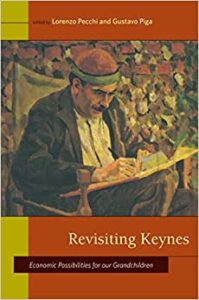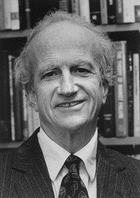A recent post of mine on “the intriguing twentieth century” focused on John Maynard Keynes’s prediction of an eightfold multiplication of GDP per capita in the century following 1930. Part of the comments and conversation dealt with a related prediction of Keynes—that leisure would increase up to the point where people would work only 15 hours a week. More should be said on why this last forecast failed.

Mark Brady of San Jose State University brought to our attention the book of Lorenzo Pecchi and Gustavo Piga (Eds.), Revisiting Keynes “Economic Possibilities for our Grandchildren” (MIT Press, 2008). It contains an interesting chapter by Harvard University’s Richard Freeman, titled “Why Do We Work More Than Keynes Expected?” (pp. 135-142). The crucial technical passage regarding leisure is the following:
[Keynes] missed the boat by failing to appreciate the power of economic incentives to induce people, even those with high standards of living, to work long and hard. He did not expect that the increased cost of leisure due to rising wages would dominate the income effect that induces people to take more leisure. … Textbooks often displayed backward-bending labor supply curves to illustrate the point. But the race between the substitution and income effects turned out to be more of a fair race than the sure-fire guaranteed winner that your local tout predicted.
An especially interesting chapter is that of Gary Becker (the famous Nobel economist) and Luis Rayo, “Why Keynes Underestimated Consumption and Overestimated Leisure for the Long Run” (pp. 179-184). Their analysis also makes much use of the distinction between the income and the substitution effects, combined with a very Beckerian human-capital analysis:
Keynes assumed that higher incomes would lead to increased demand for leisure through what is now called the “income” effect. But in the same year as Keynes published this article, Lionel Robbins published a classic article showing that higher hourly earnings have conflicting effects on hours worked. …
Keynes was misled in his predictions concerning the effect of higher income on hours worked by the behavior of gentlemen in Britain—who Keynes believed provided a window onto future behavior as everyone’s income rose. Their behavior gave a distorted picture of what to expect because these gentlemen had sizable wealth in the form of physical and financial assets, but not high human capital or earnings. So economic theory would predict that these gentlemen would take more leisure than would equally wealthy persons in the future who in fact would be holding the vast majority of their assets in human capital rather than land and other assets. English gentlemen indeed had mainly just an income effect, while those who would have to work would also have powerful substitution effects.
The reference to Robbins is interesting in itself because it betrays the kinship between the Austrian-influenced economist of the London School of Economics, and Becker, the quintessential neoclassical economist at Chicago. In my Regulation review of Robbins’s famous 1932 book An Essay on the Nature and Significance of Economic Science, I noted:
The Essay defined economics as the science that studies human behavior in allocating scarce means among competing ends, a definition that has become standard. We get a glimpse at this definition’s influence when we realize that it was adopted by Gary Becker, the standard bearer of mathematical and empirical economics, which is the polar opposite of the Austrian school.
“Polar opposite” is too strong (I should have written “appears to be”) as Robbins and Becker themselves demonstrated. Robbins’s book and my review survey these important ideas.


READER COMMENTS
Jon Murphy
May 20 2023 at 9:03am
This is a great postscript. I’ll have more to say later, but another point I’d make about the leisure is that:
If one wanted to live like a 1920s English Gentleman, then one probably only needs to work 15 hours. True, it’d mean giving up a lot like air conditioning, many electronics, etc. But, in a certain sense, his prediction came true.
Craig
May 20 2023 at 12:05pm
Interestingly certain office studies indicate workers really aren’t working the entire day anyway. Quick google I found an article saying an office worker works on average of 2 hours and 53 minutes per day! True, not sure, but the rise of ‘overemployment’ in the remote era — where a remote worker is holding down two jobs at the same time and estimates are a large % of remote workers are doing just that, suggests Keynes’ prediction may very well have been more right than wrong. And yes, for nearly century-long predictions, the precise ’15 hours’ can be forgiven.
Todd Kreider
May 23 2023 at 3:13am
“But, in a certain sense, his prediction came true.”
I don’t think so. Keynes must have known that cheap conveniences would be almost ubiquitous by 2030. About leisure, we still have seven years of improvements in A.I. and robotics before we know to what extent he will be wrong. I can see a pretty big drop in work hours by then and even more so if we give Keynes an extra five years out to 2035.
Jon Murphy
May 20 2023 at 9:21am
I recently wrote an article on Keynes’s thought (it’s here) and one thing I noticed while researching is how unwilling (or unable) Keynes was to consider the lifestyle and goals of the non-British elites. Keynes was a major devotee of noblesse oblige, and that included feeling paternalistic toward the non-elites (as well as the elites. He had no problem imposing his preferences on them, too). That others may have goals and life choices different from that of the British Aristocrat never seems to enter his mind, and that seems to influence a lot of his work.
Thomas Hutcheson
May 20 2023 at 9:38am
Perhaps Keynes was implicitly assuming that technology would be extremely “labor saving” in the sense that the MP of non-labor inputs would rise but the MP of labor would not. And that somehow (UBI-like transfers?) “everyone” would be able to live mainly off the income produced by capital.
Jon Murphy
May 20 2023 at 11:35am
I don’t have my copy of Grandchildren right now but I don’t recall him making or hinting at that argument
Thomas Hutcheson
May 20 2023 at 7:51pm
It was just a thought, but if not that, what was going to create the eight-fold increase in income? Granted different parameters on the production function could give different MPL with Lt = 0.15 L0.
Pierre Lemieux
May 20 2023 at 1:24pm
Thomas: Interesting hypothesis. But did not Keynes assume that population (and the labor force) would be kept in check while capital would increase? Would this not imply that the marginal productivity of labor would have increased (this being consistent with high wages)? And is this not consistent with Keynes’s perdicted and desired “euthanasia of the rentier” (at the end of the General Theory)? It seems that a large dose of somehow is needed to make sense of Keynes’s vision of the future.
Todd Ramsey
May 20 2023 at 11:54am
Is part of the explanation that we consume our leisure during lengthy retirements?
Pierre Lemieux
May 20 2023 at 12:45pm
Todd: I think so. An incease in financial wealth relative to human capital (and thus to remuneration from work) entails that the income effect more than compensates the substitution effect. By contrast, very successful entrepreneurs are incited not to retire or to retire much later.
Mark Brady
May 20 2023 at 4:59pm
Thank you, Pierre, for your interesting post that has generated an interesting discussion!
Comments are closed.